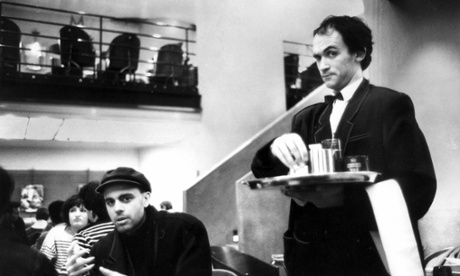
How do you solve a problem like rude French waiters? The impolite maître d’s in French bistros – long held to be the scourge of visiting tourists – could now have a fight on their hands, as the government has intervened. According to Laurent Fabius, the French foreign minister, France is suffering from a “welcome deficit”, meaning that foreign visitors are 30% less satisfied with their stays in France than in other countries. The Times snippily added that turning France into a “polite and amiable nation” would be a “Herculean task”. To which I say: “Bof.”
While some of the proposals, such as giving train announcements in English occasionally, make complete sense, others, such as the shifting of the serving attitude to that of willing supplicant, would require a more profound shift in the national psyche. Furthermore, I tentatively suggest that the perceived rudeness of French waiters may have more to do with you than it does them.
I lived in France for a year and never felt less than welcome in my adopted country. And yet many British and American expats I encountered would moan almost constantly about the service. I’ve always suspected that the rudeness you experience in France as a visitor has an almost direct correlation with how much effort that you are prepared to make when it comes to speaking the language, but there are other factors at play here, too.
Ultimately, it comes down to the experience of going from an economy that is almost entirely service-based to a country where it isn’t. To a person from Britain, where, since de-industrialisation, our economy seems to have revolved almost entirely round car insurance meerkats, spray tans and, most of all, posh burgers, this may seem strange. In France, the provision of services is not the be-all and end-all. Nor are those choosing to work in the sector regarded as the low-paid dregs of society, there to cater to your every whim.
I was a waitress for much of my time in France, and the level of respect you get from the general population is, at first, mind-boggling. Unlike in Britain, where customers often seem to be under the impression that they have hired a slave for the duration of dinner, there is no shame in working in a restaurant. Yes, your role is to bring food to the table and remove the remains afterwards but, other than that, you largely leave people to get on with it, rather than interrupting their conversation to check that everything is OK every five minutes. Food is treated with respect, and so are the people who provide it. You’re as likely to be served by a man in his 60s as you are by an 18-year-old migrant worker. Restaurant work is not seen as a low-paid, thankless job for those unable to find employment elsewhere, but as an endeavour worthy of recognition.
Cultural misunderstandings play a part, too. French colleagues were often baffled by complaints about inattentiveness, for instance, because the English model of gaining attention seemed mostly to be whispering: “Excuse me” inaudibly several times as their waiter dashed past carrying five or six plates of food. French customers, meanwhile, will simply demand a top-up or the bill in a loud – but not impolite – voice. The fact that French waiters aren’t constantly hovering around your table is not rudeness: they are merely treating you in the same way they would any other customer. If you lack assertiveness, that is not their problem. Ultimately, it’s up to you whether you choose to take this personally.
The differences between working as a waitress in France and in Britain are stark. In Britain we are seeing a shift towards an increasingly American style of service: one colleague I worked with in the UK used to sit down at people’s tables as though it were TGI Friday’s, and then there are the various gimmicky conceits (see the Twitter feed We want plates for examples). There’s something to be said for a restaurant where the staff just leave you alone. While there are undoubtedly elements of the French restaurant industry that need modernising, to lose “rude” French waiters would be a crying shame.
In an increasingly globalised economy, it’s worth remembering that sometimes other countries have different priorities. Walking around Paris last week, I struggled to find a takeaway sandwich shop. Instead of lunching “al desko”, office workers sat outside brasseries in the sunshine eating salads and drinking wine. None of them seemed to be in a rush or to have a problem with the service. But then, the service is never the main event. The company of friends and family, and the quality of the food, are what matters. In that respect, we have much to learn from the French.

